Amid all the dodgy news that has hit the American craft beer scene over the past month or so – Founders Brewing Co, the largest in Michigan, having to settle a racial discrimination suit, AB-Inbev stealing the slogan a small brewer has been using for nearly ten years, Lagunitas dumping all over community groups that had been relying on it for fund-raising, Redhook of Seattle finally being swallowed completely, New Belgium of Colorado, the fourth-largest American craft brewery, also losing its independence to a brewing megagiant – one scandalous example of appalling misbehaviour by a big brewer attempting to throw its vast weight around in a morally disgusting fashion seems to have passed by surprisingly unnoticed.
I’m referring to the attempt by AB-InBev – them again – to punish the Chicago-based journalist and author Josh Noel, in total defiance of the values of free speech and honest, upright dealing: the most shocking example of trying to crush commentary you don’t like that I can recall in the beer industry.
Josh has been writing about the Chicago beer scene for many years for the city’s big newspaper, the Chicago Tribune, and in particular he has been championing Bourbon County Stout, the whiskey-barrel-aged Imperial stout first made by Goose Island Beer Company in the mid-1990s that started an entire new beer style. In 2018 he wrote a book on BCS, Goose Island, and the acquisition of Goose Island by Anheuser-Busch back in 2011 called Barrel-Aged Stout and Selling Out, subtitled “Goose Island, Anheuser-Busch and how craft beer became big business”.
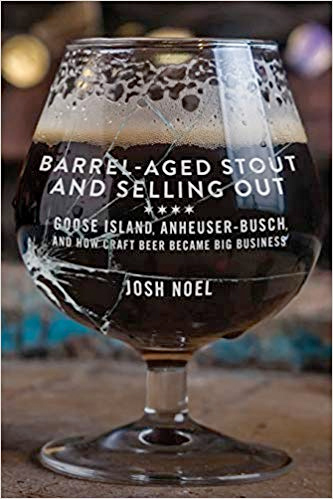
It’s one of the very best books on craft beer history I have read – possibly THE best – and one of the best business books I have seen in general. It was deservedly garlanded with the Book of the Year award by the North American Guild of Beer Writers, and if you haven’t read it, you really should get yourself a copy right now. It’s a thorough, deeply researched, sometimes brutal but totally fair and honest account of the origins and growth of Goose Island since it was founded by businessman John Hall in 1988, looking hard at the pressures that led to the sale of the brewery in 2011, and how and why the brewery, its products and ethos have changed over the decades. AB-Inbev clearly hated it.
I was going to paraphrase what happened after the book came out, but Josh wrote it up so much better than I could in a series of tweets, so here is Josh’s story, with occasional interjections by me (and American spellings). We pick it up just after Goose Island has declined to invite him to the annual preview release of the latest iteration of BCS:
“First time in the 10 years I’ve covered beer for the Chicago Tribune. I was told the brewery ‘wasn’t comfortable’ [mealy-mouthed creeps. Be honest, ye scabs – MC] with me attending. What does that mean? Who wasn’t comfortable? Why? They wouldn’t explain any of that. How’d we get here? What’s happening? Well it began last year.
Goose Island initially didn’t invite me to last year’s Bourbon County preview either — six months after my book came out. The book was mostly Goose-positive up to its 2011 sale to Anheuser-Busch. Then the story took on a lot more nuance about the brewery and brand in AB’s hands.
That change was inevitable thanks to Anheuser-Busch’s needs and goals — and why it bought Goose Island in the first place (along with 10 more craft breweries). There was no way around AB’s anti-competitive practices, lack of transparency and aim of market domination.
So, faced with not being invited to last year’s Bourbon County media preview — something about “needing to have a better working relationship” [“needing you to kiss our bottoms” more like – MC] — I argued I’d been fair and measured. Not always positive. But fair. They ultimately agreed. I attended the tasting. I championed the debut of Bourbon County Wheatwine (which went on to win a FOBAB medal). Didn’t much care for Vanilla or Bramble.
I’d been covering Bourbon County since 2010. Back then there was no media tasting. Goose Island was too busy to think much about media at all. Aside from a few dedicated bloggers, very few people were writing about Bourbon County — or craft beer in Chicago at all.
This was the earliest story I wrote about Bourbon County. About the (gasp!) $45 price tag on the first iteration of Rare Bourbon County Stout, in 2010. And year by year, buzz built for the annual Bourbon County release. As time went on, I expressed interest in tasting ahead of the releases, to tell the story of beers changing the beer drinking game in Chicago and beyond. I called Bourbon County Chicago’s “most important beer ever.”
We did annual tastings, just the brewers and me. It was low-key and very relaxed. In 2015, things changed. Biggest change: Goose and AB went all in on the barrel-aging program, building a gargantuan new barrel-aging warehouse to blow up Goose’s barrel-aging program. The brewery also realized it shouldn’t just give me and the Chicago Tribune an informal first taste. It should make an event of it. And Goose did. The first “proper” Bourbon County media tasting happened in 2015, at that barrel warehouse. It was a candlelit affair with two tables full of writers, bloggers, podcasters, etc. They’ve done it every year since, and even expanded it to NYC media.
(Side note: at that 2015 tasting, I believe I was the first person to note what would inevitably be a disastrous infection issue in four of that year’s Bourbon County beers. I said Bourbon County Coffee tasted peppery and “off to me.” But I digress …)
2015 was also the year that, thanks to the scope and scale of the barrel-aging warehouse, Bourbon County morphed from a lovely boutique product into a national workhorse. (Arguably the entire point of AB buying Goose Island.) Goose Island flooded the market with Bourbon County while also trying to maintain the aura of “exclusivity.” A beer called “Rare,” for instance, which people had stood in line/paid a premium for in 2015 landed on supermarket shelves a year later.
As part of the Anheuser-Busch machine, Bourbon County became a story beyond what was simply in the bottle. Yet, what was in the bottle also continued to matter. Bourbon County came out every Black Friday. People cared. Some of the beer was outstanding. And every year I reviewed it at Goose Island’s annual media preview with others who write about beer.
Meanwhile I wrote that book. And blogged. And found fresh ways to write about barrel-aged beers in Chicago. That included a blind tasting that showed Revolution Brewing surpassing Bourbon County in 2017. Which brings us to this year. Last week I realized I hadn’t been invited to this year’s Bourbon County tasting. So I reached out and asked what was up. That’s when I was told that the brewery “wasn’t comfortable” with me attending [translation – senior execs had got a massive snot on about Josh’s depiction of AB, and decided he needed to be punished – MC]. I asked for an explanation.
I write for the city’s largest newspaper, have written about Bourbon County for 10 years and covered Goose throughout the year, whether beer or marketing. Seems fair to be at that tasting. The issue wasn’t about special treatment or favors. It was about getting the same access as other media.
Goose Island came back with a changed story, along the lines of, “Every year there are limited seats and we have to make difficult decisions about who to invite.” Clearly untrue [indeed – why do corporations come out with this bullshit when they must know no one believes them and they simply look like shystering liars? MC], but OK, fine. It’s their party. I asked for samples of the 2019 Bourbon County beers instead, so that I could taste and review this week along with the others who will be doing so. In return, more corporate speak: “We have allocated a limited number of advance samples to the tasting events and will not be able to fulfill your request at this time.”
Blackballed by Goose Island.
Were they disinviting me because of the book? My blog posts? My Tribune coverage? Tweets? My general demeanor and disposition? I don’t know. They refused to say. Instead, they’re flying off to New York today to do a tasting for media there.
Goose Island can decide not to invite me and the Chicago Tribune to its Bourbon County media tasting for whatever reason. Its choice. But we dictate our coverage — not the people and companies we write about.”
Yes, exactly. There are two big issues here. The first is simple liberty of discussion. AB InBev is attempting to punish someone for saying things it doesn’t like. The company’s executives need to have a copy of the Fourth First Amendment to the US Constitution poked hard into their faces: “The Freedom of Speech, and of the Press … shall not be infringed.” (Addendum – just to explain, I don’t meant it’s illegal for AB InBev to ban Josh, I mean it’s utterly against the spirit of the values the country they operate in was founded upon.) The second is an important, and surprisingly little-discussed, aspect of the implied contract between sellers and buyers. If you are asking the public to give you its money for your goods and services, then there is a moral right, which you as a seller cannot and should not attempt to take away, for commentators to express their view on whether or not the exchange you are proposing – my money for your product – is a fair one. In other words, for any proposed sale/purchase, there is a right to review and to criticise which should not be suppressed, most importantly because that right is a counter-balance to the power of the seller, and acts in defence of the buyer. That applies to everything offered for sale, from theatrical performances to automobiles to beer. For AB Inbev to attempt to take that right to criticise and comment away from Josh is a morally wrong move, which should be called out, and for which the company should be ashamed.
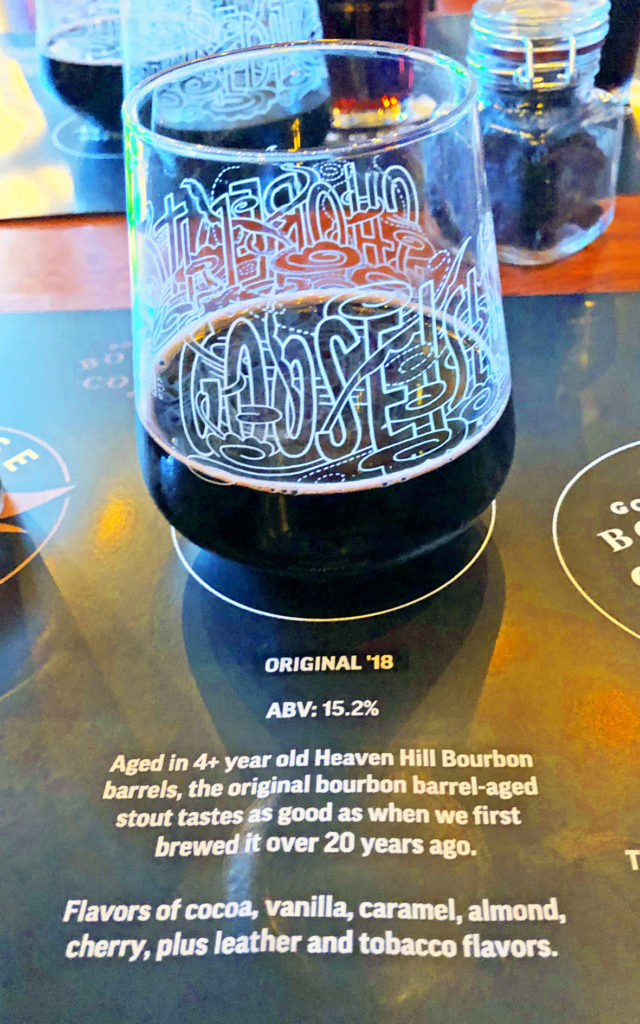
So: given I feel so strongly about what has happened to Josh, how come, you are entitled to ask, I attended TWO events this month in London organised by Goose Island/AB InBev, one celebrating the Obadiah Poundage recreation stout, the other for the UK launch of BCS, swallowed its beers (for free) and ate its pizza (for free)? Hypocritical, much? Should I not, rather than enjoying the warmth of the company’s East End bar and brewhouse, have been outside in the November cold waving a placard that declared: “I stand with Josh Noel: Boycott Goose Island!” and attempting to persuade fellow beer writers not to cross my picket line?
Um. Maybe. But ultimately, no, I think, and for a host of reasons. The first, and not the least, is that boycotting AB Inbev, is, as the old joke goes, like pissing myself in a dark suit: it might give me a warm feeling, but nobody else would notice. AB InBev wouldn’t have cared, certainly. Virtue signalling to no effect doesn’t help anybody. Second, for the first event, certainly, I was there to support several old pals, notably Ron Pattinson and Derek Prentice, who were involved in the Obadiah Poundage project, which I wrote about here, (Before you ask, I was sent a case of the beer beforehand. What’s it like? More Bretty, and rather sweeter, than I was expecting: not a beer that you absolutely have to rush out to buy, but a fascinating experiment, and worth picking up if you see it.)
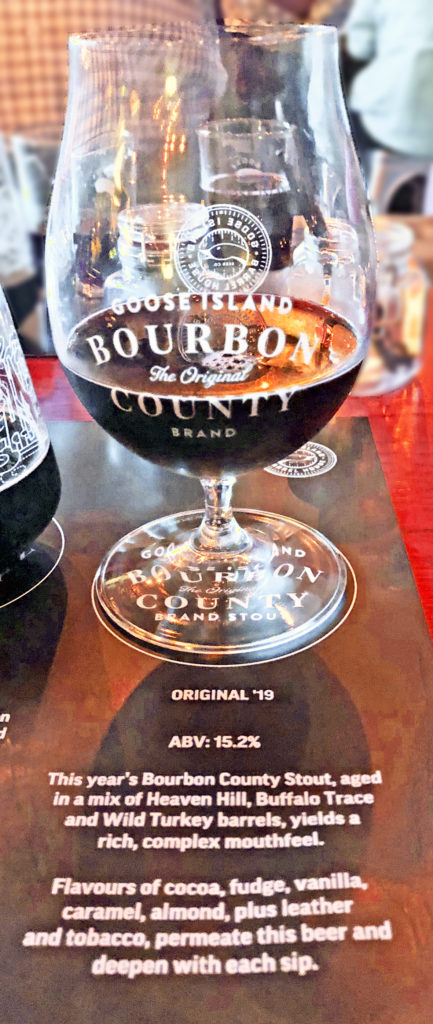
For the second event, the London launch of BCS, I was there out of extreme curiosity, having never drunk the beer before, and unsure when I would ever get the chance to again: if you write about beer, passing up the chance to drink the beer that started the whole, now massive, barrel-aged movement, in a fit of politically correct solidarity with a fellow journalist who was barred from a press call but, let’s put this in perspective, not actually blown up seems to be to be, well, unnecessary.
I know there are beer writers who eschew any involvement with corporate freebies, but my argument has always been that I’m very happy to accept free stuff, from beer to trips abroad, when it enables me to put information in front of my readers that I would not be otherwise able to give them. Certainly I do not believe I have ever held the boot back because someone had dropped off a case of beer. Carlsberg, for example, paid me to appear in one of their corporate videos, flew me to Copenhagen three times, took me to Twickenham and Wembley to see the national rugby and football teams play and stuffed me to my eyebrows with food and drink on multiple occasions, but that didn’t prevent me from being very rude about the new-look green-label pilsner earlier this year.
As it happens the Federal Trade Commission in the US has just issued a leaflet, “Disclosures 101 for Social Media Influencers”, about openness in blog posts, tweets, Instagram posts and the like, which you can see here. It says:
“If you endorse a product through social media, your endorsement message should make it obvious when you have a relationship (“material connection”) with the brand. A “material connection” to the brand includes a personal, family, or employment relationship or a financial relationship – such as the brand paying you or giving you free or discounted products or services.
Telling your followers about these kinds of relationships is important because it helps keep your recommendations honest and truthful, and it allows people to weigh the value of your endorsements.
As an influencer, it’s your responsibility to make these disclosures, to be familiar with the Endorsement Guides, and to comply with laws against deceptive ads. Don’t rely on others to do it for you.”
Which I think is entirely fair enough – and if you’re thinking “I don’t live in the US,” the FTC’s guide also points out: “If posting from abroad, US law applies if it’s reasonably foreseeable that the post will affect US consumers.”
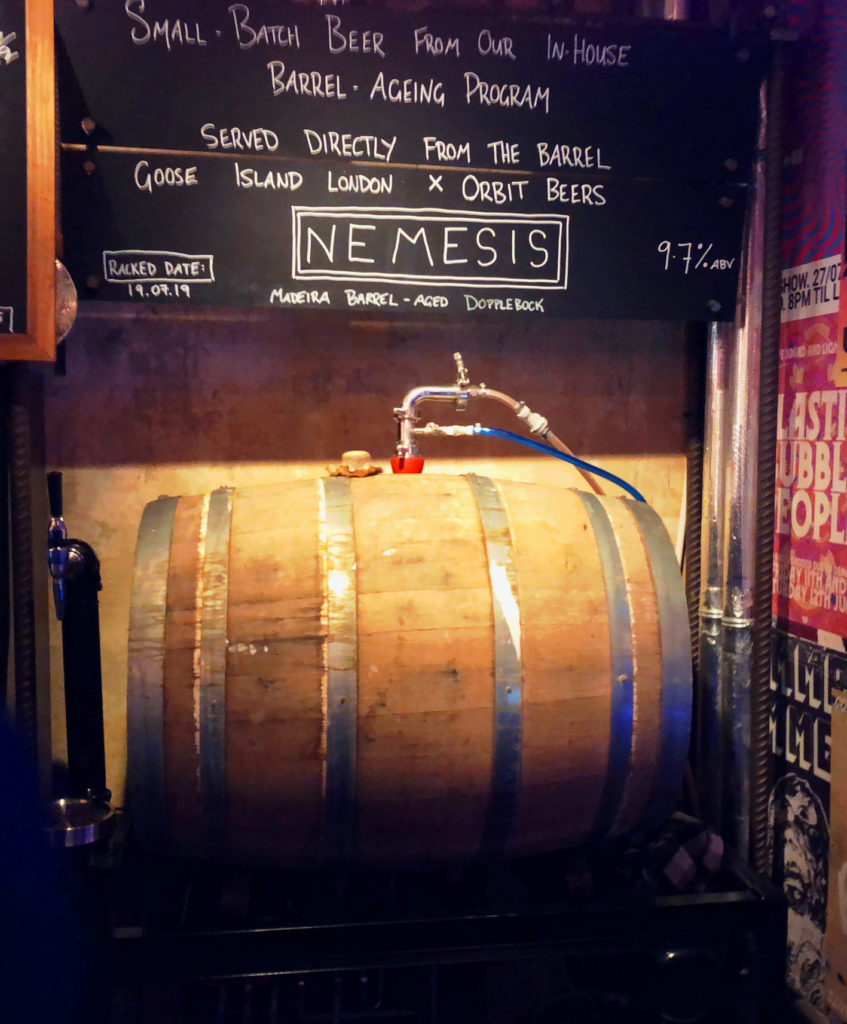
So on that basis: what were those free Bourbon County Stouts you drank like, Martyn? Very fine indeed, actually: this IS a beer you really need to track down and try. It’s massively filled with flavours, something to sip, savour and enjoy, and also, judging by the differences between the 2018 and 2019, a beer that will change in fascinating ways as it ages: the 2018, for example, was very much less coconutty than the 2019, as, clearly, the influence of the wood in the Bourbon barrel began to fade. I also greatly enjoyed two beers made at the Shoreditch brewhouse (which, incidentally, is barely a hundred yards from what was once Harwood’s Bell brewhouse, famous, incorrectly, for supposedly being the place where porter was first brewed). One was a madeira-cask-aged doppelbock, served straight from the cask it was aged in, which was wonderfully rich, the other a sour cherry and tonka bean porter, like black forest gateau in a glass.
OK, you may passionately loathe AB InBev, and vow never to approach it or its works except with a pitchfork and a flaming torch. But the unpleasant arseholes at the top of the company who decided, stupidly and unforgiveably, that Josh Noel had to be punished for not placing his nose as far up the AB InBev bottom as they wished are not the very many thousands of people who work for the company, who are doing the best jobs they can, and who are producing beers like that sour cherry porter, and that Madeira-cask-aged doppelbock, and those iterations of BCS, and those projects like Obadiah Poundage porter, and I believe THOSE people SHOULD be supported. But supporting them doesn’t mean not being as rude as possible about the bad things corporate AB InBev gets up to, and calling the company out on it as loudly as I can.
(Addendum 2: I meant to say, but forgot, so I’m saying it now, that as a fine example of how quickly myths arrive and take root, on both the embossed bottles that Bourdon County stout now comes in, and the T-shirts that Goose Island/AB InBev gives away, the claim is made that BCS was first brewed in 1992. This appears to be down to Greg Hall, who invented the beer, being unable to remember more than a decade later when he had had the dinner with the legendary Bourbon maestro Booker Noe that led to the beer’s creation. It was, as Josh Noel uncovered while researching his book, in 1995, not 1992.)
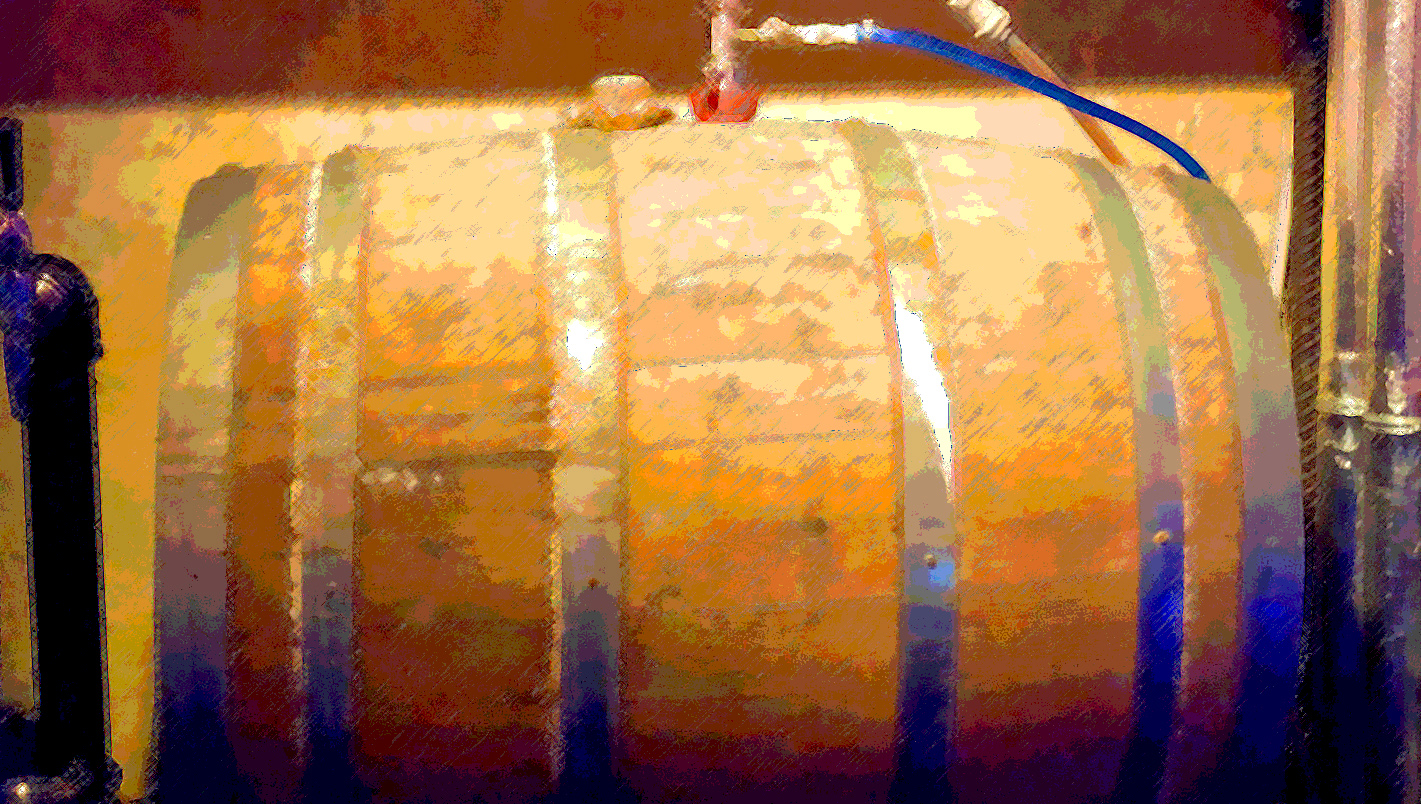

Dear Martyn,
Thanks for another great article. I’ve ordered Josh’s book as I didn’t know it existed until you wrote about it, even I grew up in the Chicago area and have great memories of drinking at and a personal tour of the Goose Island Brewery by the brewmaster back in the ’90s when it was a neighborhood pub.
You get a bit of a pass being a foreigner, but being yourself a stickler for historical accuracy, I thought you might appreciate knowing that it’s the First Amendment of the Constitution of the United States that deals with freedom of speech and the press. the Fourth Amendment, cited in your article, is about unreasonable searches and seizures.
Cheers!
Sean
Yeah, I thought it was the first, decided I’d better check on Wikipedia and came away with the idea that it was actually the fourth, don’t know why … now corrected.
First Amendment, Martyn. In any case, thanks for posting this!
Thank you, and see my answer to Sean …
Martyn, Good read. Small correction. The 1st Amendment is only about Congress restricting free speech. It is silent about the rights of private parties to engage in these activities. There may be other laws governing fair commerce, but not the 1st Amendment.
“Congress shall make no law respecting an establishment of religion, or prohibiting the free exercise thereof; or abridging the freedom of speech, or of the press; or the right of the people peaceably to assemble, and to petition the Government for a redress of grievances.“
Full disclosure: I am not an attorney nor a constitutional expert.
Yes, I wasn’t trying to say that GI/AB-InBev were legally obliged to let Josh attend their tastings, only that morally it was an offence against the spirit of free speech to deny him a place because they didn’t like what he was saying.
I usually try to be open about what breweries have provided for me. With Obadiah Poundage I didn’t bother. For the simple reason that with my name on the label, it was pretty obvious it was a commercial collaboration between me and Goose Island.
Is this breaking the rules?
Ron
Seems fair to me, especially given how much of your time doing vital research has been unpaid.
An excellent overview of the situation. I do wonder, however, whether there was a question and answer session at the London tasting of Bourbon County beers. Because I would have taken that opportunity to ask, with other media in attendance, “since he’s arguably the world’s expert on this beer, why did your company refuse to allow Josh Noel of the Chicago Tribune to participate in your tasting there?”
Mmmm – but the problem there would have been that you would have been putting on the spot people who had absolutely nothing to do with the decision to bar Josh. Which would have been unfair to them.
That is a very well-thought answer, Martyn. You’ve drawn a very nice line through the ethics of the situation, in my opinion. Thanks for the piece.
Thank you, Lew.
Being an employee of AbInbev and doing your best for them is no guarantee for being treated fair by them, witness the strike of last week in the distribution centre in Belgium.
Sadly, that is true of a great many employers, and not just the Belgo-Brazilians.
In designing the recipe, I wanted something fairly standard for an English stout, but on the low end of the roastiness, allowing the more chocolate and coffeelike flavours from the grains to dominate those flavours.
In designing the recipe, I wanted something fairly standard for an English stout, but on the low end of the roastiness, allowing the more chocolate and coffeelike flavours from the grains to dominate those flavours.